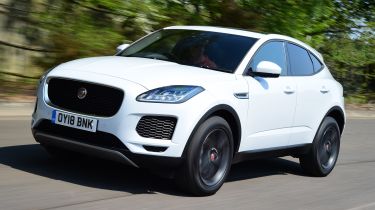Future Jaguar Land Rover models to combat car sickness
JLR algorithm to alter driving dynamics and cabin environment to reduce motion sickness in cars’ occupants

Future Jaguar Land Rover (JLR) models will be able to tell if occupants are suffering from car sickness, and adjust their settings to combat this common complaint, said to be suffered by one in five people.
JLR conducted research into motion sickness and claims it has identified techniques for reducing in-car nausea by at least 60 per cent.
• JLR testing trust in autonomous cars with googly eyed pods
The company has created an algorithm that generates a “wellness score” for each passenger in the car, which can be used to automatically personalise the vehicle’s driving and cabin settings to prevent occupants from feeling unwell.
When carrying out the research, JLR collected 15,000 miles of motion sickness data and tested the effects of performing a task – such as checking emails – while inside a moving car.
This resulted in the creation of a baseline driving style for autonomous vehicles to work towards, minimising the need for steering corrections and thus reducing the risk of motion sickness.
JLR wellness technology researcher Spencer Salter explained that in “an autonomous future where occupants will have more time to either work, read or relax on longer journeys, it's important we develop vehicles that can adapt to reduce the effects of motion sickness.”
Other JLR models already on the road – such as the E-Pace – are already fitted with more basic systems for preventing car sickness, including seating configurations for passengers to find a position that raises the infotainment screen relative to eye level and adaptive dynamics that remove low frequency motion from the road.
Motion sickness is usually caused as a result of the eyes observing information inconsistent with that received by the inner ear, skin or other senses.
How to stop car motion sickness
Of course, you don't need to wait for Jaguar Land Rover's car sickness prevention technology to reach the market. The NHS has its own advice to help counteract the problem of queasy passengers in cars...
• Sit in the fromt seat to minimise the amount of motion you experience.• Try to look straight ahead at a fixed point such as the horizon.• Open a window and get some fresh air into the car.• Close your eyes and and breathe slowly, focusing on your breathing.• Distract sick-feeling children by talking, listening to music or singing songs. • Pull over and take a break from being in the car.• Try taking ginger in a biscuit, tea or a tablet form.• Don’t read or look at display screens.• Avoid looking at moving objects such as other traffic outside the car.• Don’t eat or drink too much before traveling.
Do you suffer from motion sickness? Tell us your tips for staying well when travelling in the comments below...
Find a car with the experts






